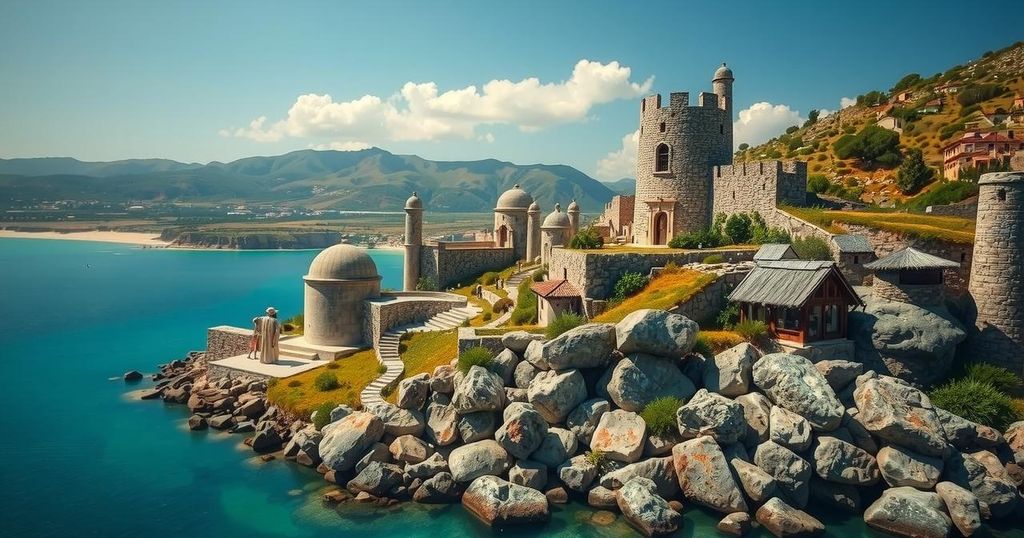Sardinia’s Autonomous Climate Leadership: A Model for Sustainable Action
Sardinia is asserting its autonomy in climate leadership, advocating for localized energy governance amidst tensions with the Italian government. President Alessandra Todde emphasizes that collective action is essential to address the climate emergency. A large-scale petition reflects widespread support for responsible energy planning, ensuring that development respects the island’s rich cultural and environmental heritage while preventing exploitation by external interests.
Sardinia is emerging as a significant climate advocate, particularly highlighted by the leadership of President Alessandra Todde in the region. During the recent U.N. Climate Change Conference, COP29, Todde reaffirmed Sardinia’s commitment to confronting the climate emergency through collaboration, especially following recent climate disasters experienced in adjacent areas. This strategic endeavor seeks to redefine Sardinia’s approach to energy production, distancing itself from the Italian government’s aggressive push for private energy projects that locals perceive as overreach and exploitation.
In an unprecedented mobilization, over 210,000 signatures were collected to support the “Pratobello 24” initiative, which aims to reclaim local authority over urban planning and renewable energy projects. President Todde’s resolute stance against decisions imposed from Rome underscores a broader movement urging governmental powers to prioritize local interests in climate action. Notably, Sardinia’s Regional Council took a significant step by enacting an 18-month suspension on numerous wind and solar projects recently authorized under previous administrations, indicating a clear shift towards sustainable energy practices governed by local values and environmental considerations.
The islands’ unique ecological and cultural landscape has been at the heart of this struggle. Activists in Sardinia remain skeptical of the profit-driven lens through which energy transition has traditionally been viewed. With a rich archaeological and cultural heritage, Sardinians fear that unchecked energy development may irrevocably disrupt their environment and societal landscape, echoing sentiments from other global protests against exploitative climate policies.
In advocating for suitable areas for renewable projects that respect the environment while contributing to energy transitions, Sardinia seeks a balanced approach. As tensions rise between the island’s governance and Rome, this situation has birthed a cultural reawakening, uniting voices from diverse backgrounds in solidarity against perceived colonial exploitation of their territory. Historical grievances against outside control persist, but Sardinia’s renewed dedication to crafting an indigenous model for sustainable progress exemplifies its potential leadership role on the climate stage.
Former Sardinian President Renato Soru’s “Project Sardinia” and grassroots initiatives from local citizens emphasize a collective drive toward sustainability, showcasing innovative eco-cultural projects that foster communal resilience. Sardinia is not solely waiting for directives from central politicians but is actively pioneering its green future, integrating historic lessons with present-day environmental activism. This active engagement of Sardinians paves the way for a promising regenerative future, embedding their cultural narrative within the broader climate movement.
Sardinia, the second largest Mediterranean island, has a distinct status as an autonomous region, enabling its local governance to respond to climate challenges with unprecedented force. As countries convene for international climate discussions, Sardinia’s situation has emerged as a focal point of resistance against policies that do not align with the community’s best interests, particularly regarding energy infrastructure. The last few years have witnessed increased activism around sustainable energy practices, with local leaders advocating for autonomy over energy decisions in light of deep connections to the island’s cultural and environmental heritage. This local struggle illustrates a broader shift occurring globally where regional voices are advocating for sustainability on their terms, resisting outside exploitation under the guise of energy development.
In conclusion, Sardinia’s fight for climate justice showcases the potential of localized movements in shaping sustainable energy policies. Under President Todde’s leadership, the island is asserting its right to determine its energy future, reflecting deeper cultural, historical, and environmental identities. As Sardinia navigates legal challenges against the Italian government, its proactive stance against invasive energy projects underscores a pivotal moment in climate activism, serving as a powerful example for communities worldwide seeking assurance that their voices are integral to the global climate discourse.
Original Source: www.salon.com




Post Comment